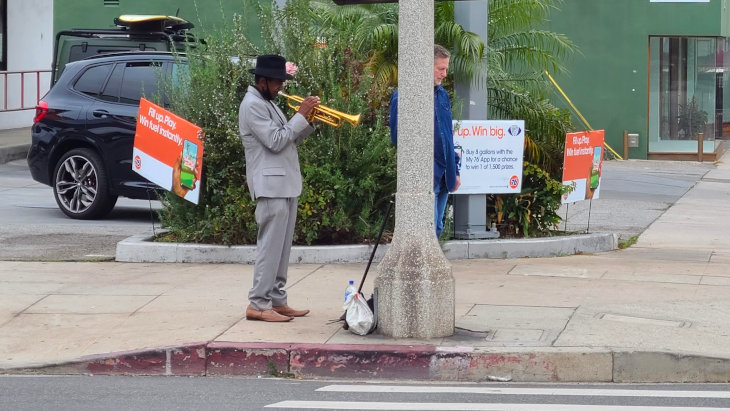 Passover’s Message of Hope in the Aftermath of Oct. 7
Passover’s Message of Hope in the Aftermath of Oct. 7


6 min read
Hearing the words you don’t want to hear. Again.
I can’t stop looking at the gray-suited trumpet player standing on the street corner. I don’t know if he’s an omen, a sign of blessing, or just a guy on the street playing the trumpet. But I was searching for meaning in everything. What else should a man do that was on his way with his wife to see if their unborn child still had a heartbeat?

This would be our second miscarriage. Well, technically the first one was a chemical pregnancy. We lost that one on Yom Kippur mere days after my wife tested positive and the excitement began.
When I had finished my morning prayer, I looked to the back of the shul to see her urgently nodding her head to meet her. I knew something was up.
Tears streaming down her face, she had started bleeding and the pregnancy we had expected would not be happening. I walked her home and tucked her into bed. She insisted I go back to shul, but I emphatically protested. Then she said the five words no husband can argue with: “I want to be alone.”
A few hours later (it was Yom Kippur – there were a whole lot of prayers), a friend at shul nudged me to tell me my wife was outside. I raced to find her doubled over in pain in the parking lot. She told me that she was having the most painful cramps and excessive bleeding of her life, but she needed to get out of the apartment and see me, even if it was just for a few moments.
Together we felt the loss, the pain, and the odd holiness of Yom Kippur. It was one of the closest moments in our nascent marriage.
We went home and my wife rested in bed while I sat there with her. Together we felt the loss, the pain, and the odd holiness of Yom Kippur. It was one of the closest moments in our nascent marriage.
Four months later and we’re in the ob-gyn’s waiting room. Actually, she’s in the waiting room. I was in the hallway. Because of Covid protocols, the father is only allowed to come to the first prenatal screening. That was when the doctor told us that the fetus was “looking a little small.”
After some back and forth, the doctor finally made it clear that “a little small” equated to “not a viable pregnancy.” Probably. Come back in a week – there’s a 25% chance it’ll right itself out.
I got the doctor’s permission to attend the second ultrasound, but the nurses still said I had to wait outside until the doctor called us in. So there I was, sitting on the carpet, cross-legged, feeling like a kindergartener as nurses and patients walk by. Then they called us in.
No heartbeat.
My wife already knew (wives always know). She had an intuition… and a foreboding dream the night before involving bleeding.
Passing our no longer viable child-to-be was my wife’s most painful experience of her life. Physically and mentally. It’s been an emotional roller-coaster. Yet as difficult as it has been, I had not shed a tear – until last week, almost nine months after the miscarriage.
Over these months, it seems that every woman of child-bearing age has either become pregnant or is ready to give birth. Instagram stories, Facebook updates, baby showers, brises, shalom zachors, baby namings, mazel tovs… they were happening all around us. Right when we would have been celebrating the birth of our child.
During this time, I tried to up my spiritual game: adding some special prayers related to fertility, praying for others who are struggling, arranging to put a prayer in the Western Wall. At a recent bris my wife and I were given kevater, the handing the newborn from the mother to the father that is an auspicious honor for couples trying to conceive. I made sure to get a blessing from the mohel and the sandek.
The following day my wife began her next menstrual cycle. Yet still, my tears didn’t come.
At my shul, I’m the guy who makes the community announcements at the end of the service. I stand up in front of everyone announcing the new births and baby’s names, sparking a chorus of mazel tovs amongst the congregants.
On this particular Shabbat, looking at the bulletin and its list of printed mazel tovs, I felt a lump in my throat. It was hard to imagine making those announcements and I began to desperately look for Yonah who sometimes does it in my stead. During a break, I went outside hoping to find him. Instead, I found the young father who had given me the honor of kevater at his son’s bris.
“Have you seen Yonah?” I asked him.
“No… why?”
I took a deep breath. Then another one. I could barely speak. “I… don’t… think… I can do…” Then I broke and the tears came.
The father said the same words that most people shared when they hear about a miscarriage: “The Kaplans tried for years and now they have four kids!” Or “Sarah and Zack had so many miscarriages before they had their first child!”
Those weren’t the words I wanted to hear. I didn’t want the particulars about an eventual success. It was incredibly painful going through the process of anxiety and pregnancy tests and seeing my wife in perpetual discomfort, just to get to the 10-week mark. Now I was being told that I may have to go through it half a dozen more times? From a man who has a newborn sleeping in a stroller?
Just recognize and validate that pain. Someone else’s joy can’t fill our aching hole.
I know this isn’t fair to the father. He and his wife were very closed-lipped about the whole pregnancy until the end. My beef isn’t really about him. He’s been great.
I didn’t want to take away from the joy of others. I didn’t want to do the announcements because I was afraid of losing my composure and drawing attention to our struggle, which would detract from the attention and joy these families deserved.
We need to do better in being more sensitive to the pain others are going through. It’s tempting to share some amazing story of someone you know who went through an uphill battle and eventually saw a tremendous light. But that’s not what my wife and I need. We’re in pain. Just recognize and validate that pain. Someone else’s joy can’t fill our aching hole.
Maybe that’s the meaning behind the trumpet player on the street corner. Somehow, he was a symbol of solemn compassion from God.
The author is using a pseudonym and all names in the article have been changed.
